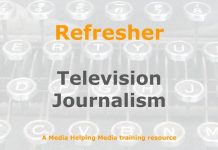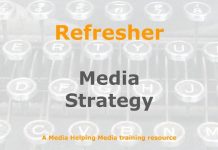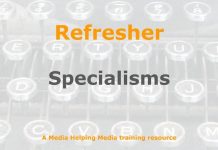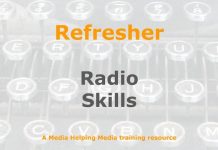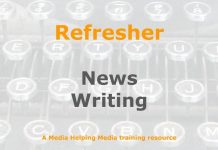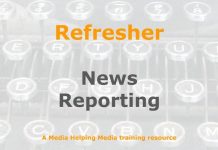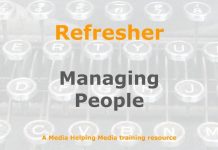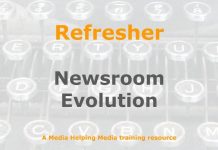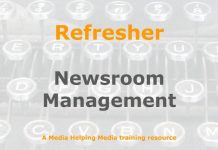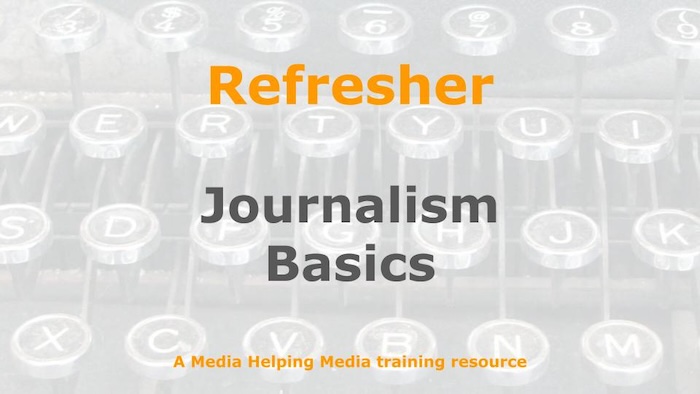 This one-day course is designed for journalists seeking a rapid and comprehensive review of the core principles and values that underpin ethical and effective reporting.
This one-day course is designed for journalists seeking a rapid and comprehensive review of the core principles and values that underpin ethical and effective reporting.
It consolidates the essential content of a six-week module covering journalism basics into an intensive, practical single-day programme, ensuring your journalistic foundation remains robust, accurate, and fair.
We recommend that participants read the resources listed below before attending this refresher.
Learning objectives
Upon completion of this intensive programme, participants will be able to:
- Define the non-negotiable duty of accuracy and implement rigorous fact-checking protocols.
- Apply clarity and structure principles to news writing, ensuring immediate audience comprehension.
- Develop a sharper news sense to distinguish between routine events and significant public interest stories.
- Demonstrate reporting that is impartial and fair, offering a right of reply and balancing diverse perspectives.
- Identify and manage conflicts of interest to safeguard independence from political or commercial influence.
- Uphold high ethical conduct in newsgathering, ensuring accountability, respect for privacy, and minimal harm.
Programme schedule, topics, and activities
The day is structured into four core sessions, each dedicated to a cluster of fundamental journalistic principles.
1. The core craft (09:30 – 11:00)
- Topics: Accuracy and news writing
- Focus: The primary duty of verification and the application of clear, concise, and structured writing (the inverted pyramid).
- Activity: Fact-checking and copy-editing drill. Participants will correct factual errors in a short, pre-written story and rewrite poorly structured press releases into sharp news leads.
- Recommended reading resources:
(11:00 – 11:15) Break
2. Finding and shaping the news (11:15 – 13:00)
- Topics: Recognising a story and impartiality
- Focus: Developing a sharp ‘news sense,’ identifying public relevance, and reporting without allowing personal opinion or bias to distort the narrative.
- Activity: ‘News or noise?’ debate and sourcing audit. Participants will debate the public interest value of various contemporary topics and critique existing articles to assess the fairness and balance of their source representation.
- Recommended reading resources:
(13:00 – 14:00) Lunch
3. The moral compass (14:00 – 15:30)
- Topics: Fairness and independence
- Focus: Treating subjects with dignity, ensuring a ‘right of reply,’ and protecting editorial integrity by managing and resisting pressure from political or commercial interests.
- Activity: Right of reply simulation and scenario role-play. Teams will draft communications to an accused party to ensure fairness and role-play navigating a classic conflict-of-interest situation, such as pressure from a key advertiser.
- Recommended reading resources:
(15:30 – 15:45) Break
4. Upholding integrity (15:45 – 17:00)
- Topics: Ethical conduct
- Focus: Synthesising all principles, ensuring transparency in sourcing, accountability for mistakes, and applying ethical frameworks to minimise harm whilst fulfilling the duty to inform.
- Activity: Case study analysis. Reviewing and discussing a complex ethical dilemma from recent media history (e.g., public interest vs. individual privacy) and collaboratively formulating the most ethical editorial response.
- Recommended reading resources:
Concluding summary (17:00 – 17:30)
Recap and discussion
Course leader will remind participants of the fundamental principles of accuracy, fairness, impartiality, and independence and how their responsibility is to distil complex information clearly, to check every detail rigorously, and to uphold ethical standards when under pressure.
By successfully completing this refresher, participants will have renewed their commitment to these core values, ensuring their work continues to serve the public interest.
Related material
